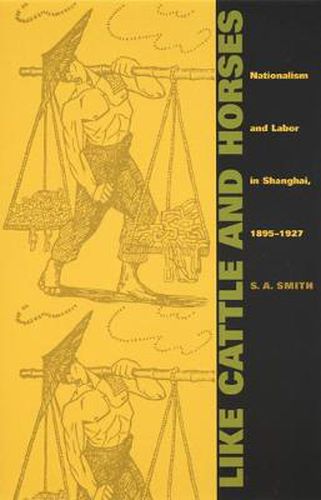Readings Newsletter
Become a Readings Member to make your shopping experience even easier.
Sign in or sign up for free!
You’re not far away from qualifying for FREE standard shipping within Australia
You’ve qualified for FREE standard shipping within Australia
The cart is loading…






In Like Cattle and Horses Steve Smith connects the rise of Chinese nationalism to the growth of a Chinese working class. Moving from the late nineteenth century, when foreign companies first set up factories on Chinese soil, to 1927, when the labour movement created by the Chinese Communist Party was crushed by Chiang Kai-shek, Smith’s study uses a host of documents - journalistic accounts of strikes, memoirs by former activists, police records - to argue that a nationalist movement fuelled by the effects of foreign imperialism had a far greater hold on working-class identity than did class consciousness alone. While the massive wave of labour protest in the 1920s was principally an expression of militant nationalism rather than of class consciousness, Smith argues, elements of a precarious class identity were in turn forged by the very discourse of nationalism. By linking work-related demands to the defence of the nation, anti-imperialist nationalism legitimised participation in strikes and sensitised workers to the fact that they were worthy of better treatment as Chinese citizens. Smith shows how workers’ refusal to be treated like cattle and horses (a line from an anonymous worker’s poem on poor working conditions) derived from a new but powerfully felt sense of dignity. In short, nationalism enabled workers to interpret the anger they felt at their unjust treatment in the workplace in political terms and to create a link between their position as workers and as members of an oppressed nation. By focusing on the role of the working class, Like Cattle and Horses is one of very few studies that examines nationalism from below and that acknowledges the powerful agency of the non-elite. Like Cattle and Horses will interest historians of labour, modern China, and nationalism, as well as those engaged in the study of revolutions and revolt.
$9.00 standard shipping within Australia
FREE standard shipping within Australia for orders over $100.00
Express & International shipping calculated at checkout
In Like Cattle and Horses Steve Smith connects the rise of Chinese nationalism to the growth of a Chinese working class. Moving from the late nineteenth century, when foreign companies first set up factories on Chinese soil, to 1927, when the labour movement created by the Chinese Communist Party was crushed by Chiang Kai-shek, Smith’s study uses a host of documents - journalistic accounts of strikes, memoirs by former activists, police records - to argue that a nationalist movement fuelled by the effects of foreign imperialism had a far greater hold on working-class identity than did class consciousness alone. While the massive wave of labour protest in the 1920s was principally an expression of militant nationalism rather than of class consciousness, Smith argues, elements of a precarious class identity were in turn forged by the very discourse of nationalism. By linking work-related demands to the defence of the nation, anti-imperialist nationalism legitimised participation in strikes and sensitised workers to the fact that they were worthy of better treatment as Chinese citizens. Smith shows how workers’ refusal to be treated like cattle and horses (a line from an anonymous worker’s poem on poor working conditions) derived from a new but powerfully felt sense of dignity. In short, nationalism enabled workers to interpret the anger they felt at their unjust treatment in the workplace in political terms and to create a link between their position as workers and as members of an oppressed nation. By focusing on the role of the working class, Like Cattle and Horses is one of very few studies that examines nationalism from below and that acknowledges the powerful agency of the non-elite. Like Cattle and Horses will interest historians of labour, modern China, and nationalism, as well as those engaged in the study of revolutions and revolt.